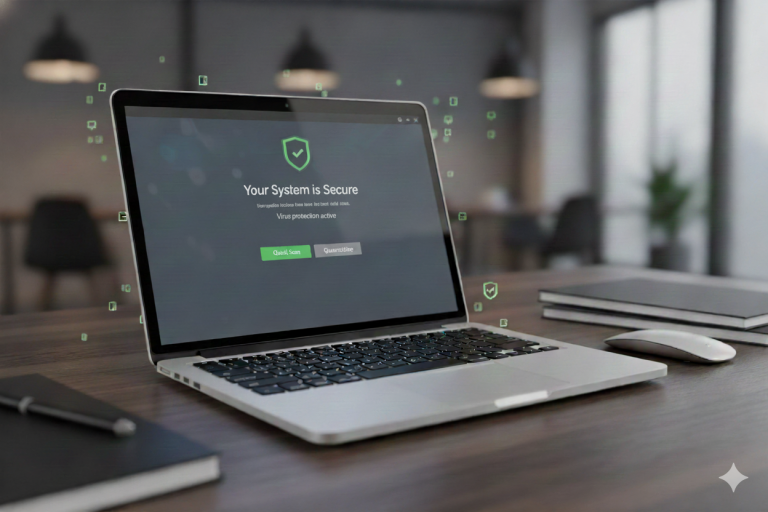Smartphones are no longer private gadgets. For small and medium-sized businesses, they have become core business tools: email access, cloud services, authentication apps, customer communication, online banking, internal dashboards and sensitive company data – all carried in one device.
Against this backdrop, it is understandable that many business owners and employees feel uneasy when they see ads or recommendations for mobile antivirus apps. Well-known names promise protection against hackers, Trojans and data theft, often suggesting that your smartphone is constantly at risk without additional software.
The instinct is familiar: better safe than sorry.
So why not install an antivirus app right away?
Here is the uncomfortable truth: for most smartphones, especially in business environments, traditional antivirus apps are unnecessary – and sometimes even counterproductive.
Modern mobile operating systems such as Android are designed with security at their core. Built-in mechanisms already prevent classic malware scenarios long before third-party apps come into play. Adding consumer-grade antivirus software often provides little additional protection, while introducing new risks such as excessive data collection, performance issues, battery drain or a false sense of security.
For SMEs, this distinction matters.
Mobile security is not about installing more apps – it is about understanding real risks and managing devices responsibly.
In this article, we will take a clear, business-focused look at:
-
Why smartphones do not need traditional virus protection
-
The hidden risks antivirus apps can introduce
-
Where the real mobile threats for SMEs actually come from
-
What practical measures truly improve smartphone security in a business context
By the end, you will have a clear answer to an important question:
Antivirus apps for smartphones – security necessity or unnecessary distraction?
1. Why your smartphone doesn’t need traditional antivirus protection
For a long time, antivirus software was considered mandatory on desktop computers. Anyone who used the internet in the early 2000s without protection quickly learned this the hard way. Worms, Trojans and spyware could spread through entire systems, often unnoticed, and cleaning up the damage was difficult and time-consuming.
Smartphones, however, follow a fundamentally different security model — especially Android devices.
One of the key differences lies in how apps are isolated from each other. On a traditional PC, malicious software could often access large parts of the system once it gained a foothold. On Android, every app runs in its own isolated environment, known as sandboxing. This means an app cannot simply interact with other apps or access their data unless it is explicitly allowed to do so.
In practical terms, your banking app and your gaming app are strictly separated. Even if a game were to contain malicious code, it would not be able to access sensitive financial information unless the user grants excessive or suspicious permissions. This architectural separation alone blocks many attack scenarios that were common on desktop systems.
In addition to this built-in isolation, Android includes a native security mechanism in the form of Google Play Protect. Apps available through the official Play Store are scanned automatically before installation and continuously monitored afterwards. Suspicious behaviour is detected in the background, without requiring any action from the user.
This layered approach significantly reduces the likelihood that classic malware ever reaches a device in the first place.
Modern Android smartphones regularly receive security patches that close known vulnerabilities. Depending on the manufacturer and device model, these updates are delivered monthly or quarterly. As a result, many security flaws are addressed before they can be exploited on a large scale.
It is also worth noting that smartphones do not suffer from the same type of “virus problem” known from traditional PCs. The technical architecture is different, and self-propagating viruses — in the classic sense — are extremely rare in the Android ecosystem. The majority of real-world incidents today do not involve malware spreading automatically, but rather phishing attacks, fake websites, manipulated apps or social engineering techniques.
Against these threats, traditional antivirus apps offer limited protection. Awareness, permissions management and responsible usage play a far greater role than additional scanning software.
In short, modern Android smartphones are already well protected by design. For most users and businesses, installing a traditional antivirus app does not significantly improve security — and often adds unnecessary complexity instead.
2. The dark side of antivirus apps
Many users assume that installing an additional antivirus app on their smartphone can only be beneficial. The idea of “extra protection” feels reassuring, especially when business data and sensitive accounts are involved. In reality, however, this assumption often proves misleading — particularly in professional environments.
On business smartphones, antivirus apps usually run continuously in the background. They scan files, monitor network activity and generate alerts, all of which consume system resources. The result is often shorter battery life, slower app performance and increased strain on the device, especially on older or mid-range models. While this may seem like a minor inconvenience at first, it can quickly turn into a security issue. Devices that feel sluggish tend to receive delayed updates, ignored warnings or frustrated user behavior — none of which improve an organisation’s security posture.
An even more problematic side effect is psychological. Once an antivirus app is installed, many users feel protected and lower their level of caution. Links are clicked more quickly, attachments opened with less scrutiny and apps installed without careful consideration. Yet the most common mobile threats today — phishing messages, fake login pages and social engineering attacks — are not reliably prevented by traditional antivirus solutions. In this sense, the perceived protection can encourage exactly the behaviour attackers depend on.
Privacy is another aspect that deserves attention. Many antivirus apps promote themselves as guardians of security and privacy at the same time. In practice, this promise does not always hold up. Depending on the provider, such apps may collect extensive telemetry data, analyse user behaviour or share information with third parties. Free versions frequently display advertisements, which can introduce additional tracking and potential attack surfaces. The irony is obvious: software designed to protect users from digital surveillance may itself become a source of unwanted data exposure.
Finally, there is the issue of cost and value. Most mobile antivirus apps follow a familiar subscription model, offering a limited free version combined with frequent prompts to upgrade. Premium subscriptions often unlock features that modern mobile operating systems already provide by default, such as device tracking, app restrictions or basic theft protection. For SMEs, this means paying recurring fees for functionality that does not meaningfully improve security.
Taken together, antivirus apps on smartphones rarely represent a real security upgrade. More often, they introduce performance issues, privacy concerns and a false sense of protection. For small and medium-sized businesses, effective mobile security is not about adding more software, but about maintaining clarity, control and responsible device management.
3. The real dangers for your smartphone
The fact that traditional viruses play only a minor role on Android does not mean that smartphones are inherently safe. On the contrary: attackers have simply adapted their methods. Instead of exploiting technical weaknesses in the operating system, they increasingly target people, behaviour and everyday situations.
Today’s most successful attacks rarely begin with malware. They begin with deception.
One of the most common and effective attack methods is phishing. Messages that appear to come from a bank, a delivery service or a well-known platform urge users to act immediately. Accounts are supposedly blocked, parcels cannot be delivered, or security checks must be completed. The links in these messages lead to deceptively realistic websites that ask for login credentials, verification codes or payment information. Once entered, this data is immediately harvested by attackers.
No antivirus app can reliably prevent this type of attack. The deciding factor is not software, but whether the user recognises the deception in time.
Another significant risk comes from apps installed outside the official app store. Android allows the installation of applications from external sources, which can be convenient in certain scenarios. At the same time, this flexibility creates an attractive entry point for attackers. Modified or “free” versions of paid apps circulate on forums and download sites. Even if such apps appear to function normally, they often contain hidden components that collect data, display intrusive advertising or open backdoors for further abuse.
Public Wi-Fi networks represent another underestimated threat. Free networks in cafés, hotels, airports or trains are often poorly secured or deliberately manipulated. Attackers can intercept unencrypted traffic, set up fake hotspots with convincing names or monitor login attempts. Without additional protection, activities such as online banking, shopping or accessing business accounts become particularly risky in these environments.
Beyond technical vectors, social engineering plays a central role. Many attacks succeed not because of software vulnerabilities, but because they exploit trust, urgency or emotional pressure. Calls from alleged support services, messages from supposedly distressed relatives or fraudulent competitions on social media are designed to bypass rational judgement. Antivirus software offers little defence against such manipulation.
Ultimately, everyday carelessness remains one of the biggest risk factors. Blindly granting app permissions, reusing the same passwords, postponing updates or clicking through warnings without reading them can undermine even well-designed security mechanisms. A smartphone may be technically well protected, but careless behaviour can effectively leave the door open.
The real threats to smartphones today are therefore not classic viruses. They are phishing attempts, manipulated apps, insecure networks and human error. Understanding this reality is essential for choosing an effective security strategy — and it explains why traditional antivirus apps are largely ineffective against the risks that matter most.
4. How to really protect your smartphone
Effective smartphone security does not start with installing yet another app. It starts with using the security mechanisms that are already built into the system — consistently and consciously. Modern Android devices provide a solid foundation. The key is knowing where to focus attention.
A first and essential step is controlling where apps come from. Installing applications exclusively from trusted sources such as the Google Play Store significantly reduces the risk of malicious software. Apps distributed via dubious websites or unofficial APK downloads often promise “free premium features,” but frequently come at the cost of hidden malware or data abuse. In a business context, saving a few euros is rarely worth the potential security damage.
Keeping the system up to date is equally important. Android updates and manufacturer patches close known security vulnerabilities, while app updates often fix weaknesses that attackers actively exploit. Devices that are not updated regularly quickly become easy targets. Enabling automatic updates and restarting the device periodically helps ensure that protective measures are actually applied.
Another area that deserves regular attention is app permissions. Many users grant access without questioning whether it is truly necessary. Over time, this leads to apps collecting far more data than required for their function. Reviewing permissions and applying the principle of least privilege — only allowing what is absolutely necessary — significantly limits potential abuse if an app turns out to be problematic.
Phishing remains one of the most dangerous attack vectors, and technical tools offer only limited protection. A cautious mindset is therefore essential. Links in unexpected messages, emails or SMS should always be treated with suspicion. For sensitive actions such as banking or online shopping, it is safer to use official apps or manually enter known web addresses instead of clicking on embedded links. When in doubt, verifying a request directly with the provider can prevent serious damage.
Strong authentication practices further strengthen mobile security. Using unique, complex passwords for each service is crucial, and managing them manually is unrealistic for most users. Password managers such as Bitwarden or 1Password help maintain good password hygiene without sacrificing usability. Wherever possible, two-factor authentication should be enabled to protect accounts even if credentials are compromised.
Public Wi-Fi networks are another common risk area. In hotels, cafés or airports, network traffic can often be intercepted or manipulated. Using a VPN encrypts the connection and prevents third parties from reading or altering transmitted data. For business travellers, this is not an optional extra, but a basic protective measure.
Finally, simple additional safeguards can make a meaningful difference. A secure screen lock using a PIN or biometric authentication prevents unauthorised access if the device is lost. Built-in device location and remote locking features allow smartphones to be secured or wiped when necessary. Regular backups ensure that important data can be restored quickly, even if the device itself is compromised.
Taken together, these habits provide far stronger protection than any traditional antivirus app. They reduce risk, preserve performance and give users — and businesses — real control over their data. Security on smartphones is not about adding more software, but about making smarter decisions every day.
✔ Smartphone Security Checklist for Businesses
🛡️ Only download apps from trusted sources
Install applications exclusively from official app stores and verified providers.
🛡️ Keep your system and apps up to date
Apply operating system and app updates promptly to close known security gaps.
🛡️ Check permissions regularly
Review app permissions and allow only what is strictly necessary for functionality.
🛡️ Be careful with links and messages
Treat unexpected emails, SMS and messages with caution, especially when they contain links.
🛡️ Use strong passwords and two-factor authentication (2FA)
Protect accounts with unique passwords and an additional verification factor wherever possible.
🛡️ Enable a VPN on public Wi-Fi
Encrypt your connection when using public or untrusted networks to prevent data interception.
By following these practices, companies achieve a significantly higher level of mobile security than any consumer-grade antivirus app can provide — while maintaining performance, stability and data control.
Sustainable mobile security is achieved through controlled usage and informed users, not through additional apps.
Conclusion: Does your company need antivirus on smartphones?
The short answer is no — at least not in the way it is commonly advertised. Modern Android smartphones are built with security in mind. Core mechanisms such as app sandboxing, built-in threat detection and regular security updates already address the type of risks that traditional antivirus apps claim to solve. In practice, these apps rarely add meaningful protection and often introduce unnecessary trade-offs in performance, battery life and privacy.
Real smartphone security does not come from installing more software. It comes from understanding where the actual risks lie and responding to them appropriately. Downloading apps only from trusted sources, keeping the operating system and applications up to date, managing permissions carefully and behaving cautiously on public networks are far more effective measures than any consumer-grade antivirus solution.
The most serious threats today are not classic viruses. They are phishing attacks, manipulated websites, insecure Wi-Fi connections and human error. Antivirus apps are largely ineffective against these risks.
By focusing on awareness, system hygiene and responsible usage, you gain better protection, preserve device performance and maintain control over your data — without relying on expensive and largely redundant “security suites.”
You may also be interested in:
Cyberattack Emergency Plan – What to Do When It Happens
How to Protect Your Company’s Mobile Phones and Laptops from Cyber Threats
Why Small Businesses Can’t Afford Weak Protection in 2026
Why Virus Protection Alone Is Rarely Enough – and Why Knowledge Is the Key
Connect with me on LinkedIn
This is what collaboration looks like
Take a look at my cybersecurity email coaching
And for even more valuable tips, sign up for my newsletter





